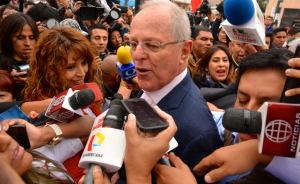By Paula Dupraz-Dobias ✐

Final confirmation of election results Friday, setting Pedro Pablo Kuczynski as president-elect, ended a bitter presidential campaign polarized around the issues of democracy and political memories. But with the party of opponent Keiko Fujimori holding a majority in Congress, Kuczynski’s government will have to contend with political challenges.
Peruvians waited nearly a week before the electoral jury (JNE) endorsed results with nearly 100% of results counted, leaving the 77-year-old former prime minister and investment banker only 42,500 votes ahead of opponent Keiko Fujimori, the daughter of the imprisoned former president Alberto Fujimori and leader of the Fuerza Popular party.
After the first round of voting on April 10, in which Kuczynski won 21% of the vote behind Fujimori’s 40%, voters regrouped into pro- and anti-Fujimoristas, with their vote reflecting their support or disdain for Alberto Fujimori’s government.
In 2001, when secret video recordings showed concerted corruption of officials by Fujimori’s intelligence chief, VladimiroMontesinos, Fujimori fled to Japan and resigned by fax. He was subsequently sentenced to prison on corruption and human rights abuses in Peru, after being extradited from Chile.
Keiko Fujimori – who like Kuczynski, campaigned in the 2011 presidential election – remained popular in regions that had been affected in the 1980s and 90s by terrorism until her father’s government violently defeated rebels.
In Lima’s Jesus Maria district, one voter, Carlos Urquizo, a business entrepreneur, told Peruvian Times that many people were reluctant to support Keiko Fujimori due to her father’s controversial legacy.
“Keiko did not separate herself enough from her father. She has not assured that there would be a continuation of democracy in Peru. She was not capable of saying that she was not the same as her father.”
In the popular Lima neighborhood of La Victoria, which hosted a breakfast for the 77-year old Kuczynski on the morning of the election last Sunday, Jerena Antesana, a street vendor, admitted that people in the neighborhood were split behind the two candidates, but that she had always voted for Kuczynski.
“I was so moved that he came here. He is a man of lots of experience and is with the people.”
During his stop to the neighborhood, Kuczynski told residents: “We want democracy, transparency and hope to allow us to move away from corruption and drug trafficking.”
Ines Rossi, a former university professor, explained why she had voted for PPK.
“I fought very hard against Alberto Fujimori, against that dictatorship,” she said, explaining that she participated in 2000 in the “Marcha de los Cuatro Suyos” a huge protest march led by then presidential candidate Alejandro Toledo against former President Fujimori’s constitutional reforms allowing him to be re-elected for a third time.
“I am shocked by Keiko.”
Kuczynski’s victory came after polls showed significant gains in support in the last week of campaigning, after lagging over five points behind the Peruvian-Japanese candidate.
Alfredo Torres, director of Peru’s leading polling firm Ipsos, attributed the last minute gains to various factors. He said Kuczynski’s perceived strong performance in the final debate as well as support from Veronika Mendoza, the leftwing candidate who lost to Kuczynski in April, and a final protest march against Fujimori, appeared to assist Kuczynski.
Also in the week prior to the election, Fujimori’s campaign was complicated by the reports that Fuerza Popular’s secretary general Joaquin Ramirez was being investigated by the United States’ Drug Enforcement Agency for money laundering.
This past Friday afternoon – while Fujimori finally endorsed the election results “democratically” – Fujimori vowed that Fuerza Popular will play its role “with strength” in opposition to Kuczynski’s government.
In April, Fuerza Popular gained a majority in Congress, with 73 out of the 130 representatives.
Kuczynski’s Peruvians for Change (Peruanos por el Kambio) party, meanwhile, said it would request legislative powers to implement security and economic measures during the first “two or three” months in power.
“We have to turn the page,” Kuczynski said Saturday evening. “During the campaign on both sides, things were said that possibly should not have been said. There was an election, a result, and now we have to work together on basic issues that Peru needs.”






I married into a fine Peruvian family and consider it my “second” nationality. I believe PPK has the experience, knowledge and skill to bring Peru to a higher level. Having a president without baggage will encourage investment from abroad, and hopefully will bring the poorest Peruvians a change for the better.